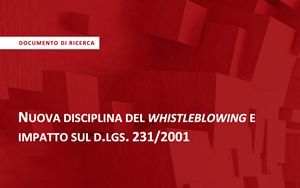(Finance) – Provide an interpretative response to the first application problems of the recent national legislation on whistleblowing, provided for by Legislative Decree no. 24 of 10 March 2023 implementing Directive (EU) 2019/1937 which, completely repealing the previous regulation, contains in a single text a system of rules intended for the public sector and the private sector. This – the Cndcec says in a note – is the purpose of the document “New Whistleblowing regulation and impact on Legislative Decree 231/2001”published by National Council of Accountants. The document, mainly addressed to the private sector, was created within the “Compliance and organizational models of companies” delegation area, of which the two are delegated councilors Fabrizio Escheri and Eliana Quintili.
The recent legislation, aimed at protecting individuals who report illegal conduct of which they become aware in the workplace, has the aim of encouraging reporting in order to protect the public interest and the integrity of the entity. The new regulation, between obligations and protections, provides for the establishment and regulation of specific reporting procedures (internal, external channels and public disclosure), guaranteeing confidentiality and establishing a specific regime applicable in case of retaliation.
“There is no doubt – they write Escheri and Quintiles in the introduction to the document – the impact of this new reporting management method on the internal control system and on the organizational structures of companies, as well as on the organizational models pursuant to Legislative Decree 231/2001. We refer in particular to the effects of the new regulation on organizational models, on the methods of reporting offenses and their management, as well as on the role of the Supervisory Body and on the opportunity for the latter to be assigned the function of manager of reports. This document – they conclude – provides a first analysis of the impacts of the new whistleblowing discipline on the organization of companies, waiting for best practices and jurisprudence to provide new elements in order to adequately place this piece of the new corporate culture in the scope of the internal control and risk management system”.
